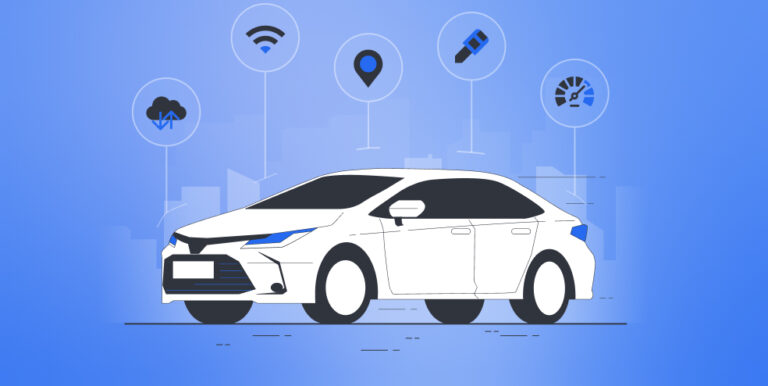In this article, we are going to tackle the issues discussing the future of IoV (Internet of Vehicles), real benefits for business, examples and key points to consider in the process of IoV app development and implementation.
According to estimates, the total number of connected devices is to reach 41 billion by 2027. IoT technology has enabled the automotive industry to make a real breakthrough. The overall connectivity has completely changed the vehicle industry, made the rides safer and the driving experience more pleasant. For car manufacturers, it meant the reduction of costs since it allowed them to introduce game-changing software updates that can seamlessly be downloaded onto vehicle software. It enhances the manufacturing process and makes products more user-oriented. Nowadays, the internet of vehicles helps manufacturers supply the market with the next-generation vehicles and revolutionize the way people interact with vehicles. Is that the limit of IoT potential?
IoT in the automotive industry – general overview
Sooner or later every automotive company will reinvent itself as a data-driven one. IoT in the automotive industry is a term comprising the integration of sensors, clouds, and apps into vehicles to make them ultra-connected and use a unified ecosystem to enable auto connectivity, predictive maintenance, fleet management, etc. Manufacturers can open up new possibilities for vehicle users by implementing various new features and experiences with new software updates.
IoT software in the automotive industry has revamped car inspection and maintenance, enabled new entertainment experiences for drivers and even in part facilitated assisted/autonomous driving. Moreover, modern automotive telematics enables more efficient transmission of data more efficiently and easier updating. It reduces the costs for the manufacturer and decreases the inconvenience for the driver since vehicles are becoming more and more complex.
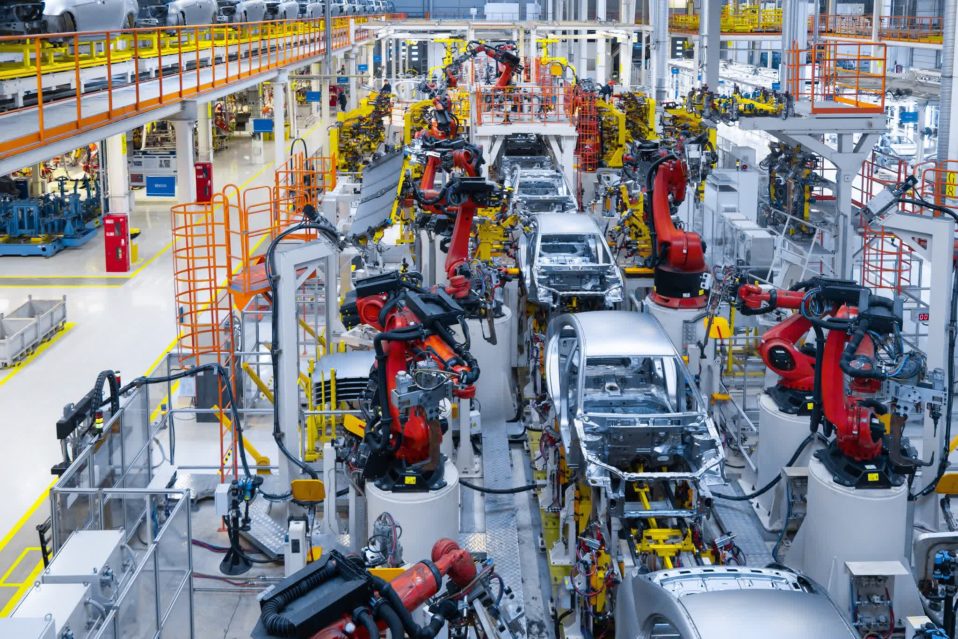
IoV development has helped in the emergence of IoT-powered fleet management systems. Vehicles are embedded with multiple sensors enabling weight measurement, location tracking, route management, etc. thus helping to overcome some major fleet management challenges.
IoT for car manufacturers and business owners who want to rule the future and keep up with the latest trends is the best technology to consider. It for sure stands for growth, expansion of potential, optimization of the internal process, and making the business more data-driven and stable.
Why should you consider investing in IoV?
The automotive industry has to seize new digital opportunities and reinvent itself organization by organization; the trailblazing nature of EV technology, IoV development, AI, autonomous driving – all go hand-in-hand. Technology will enable manufacturers to offer new kinds of experiences, improve the level of vehicle maintenance and upgrading. Otherwise, if they continue down the same old road, they risk jeopardizing their reputation, growing out of favor on the market, or even becoming obsolete.
Watch the video below, where the leading car manufacturers are sharing their opinions concerning the importance of vehicles connectivity.
https://youtu.be/_Ta2exPjB84
According to this IBM automotive report, 57% of the supply chain industry will feel the positive impact through IoT in automotive and AI implementation. The opportunity to extract valuable data insights concerning movement, condition of the goods and materials, and predictive maintenance will change the way they react to changes.
Here are the key reasons why it is worth implementing IoT in the automotive industry:
- Enhancement of the manufacturing process and risk reduction;
- Ability to access updates and maintenance details with the convenience of your smartphone;
- Use data insights and IoB(Internet of Behavior) to combine information of vehicle usage with personal needs to optimize and customize the experiences and improve customer loyalty;
- Identify what is significant for the business and craft the right value proposition with data received and processed;
- Guarantee data security and privacy increasing the consumer’s confidence;
- Implement improvements based on consumer needs and innovate faster and speed up the manufacturing;
- Identify the critical points at early stages and instantly act to drive business in the right direction;
- Keep up with the latest trends on the market.
Implementation of the internet of vehicles has revamped the automotive industry, making vehicles smarter, safer, and ultimately more efficient. Investment into IoT for automotive apps will give you crucial advantages, such as for example:
Real-life examples of IoT implementation in the automotive industry
Companies that are willing and ready to innovate and digitize themselves become the top players on the market. They are flexible and innovative enough to adopt the latest trends helping to optimize manufacturing, vehicle management and improve customer service. Here are some real-life examples of how global market leaders have successfully adopted IoT-connected vehicles technology.
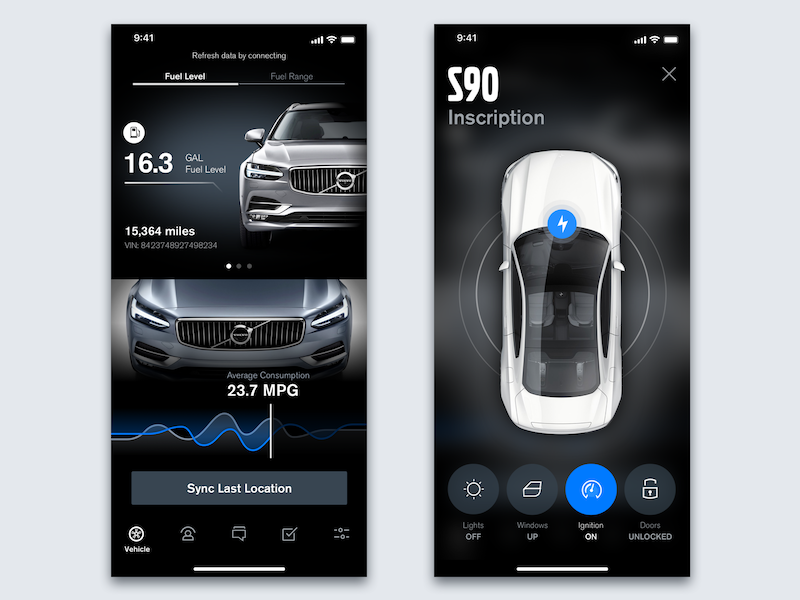
Volvo car manufacturers with the support of the internet of vehicles technology have created a unique Volvo on Call service. It allows putting owners in touch with their vehicles instantly. A driver can access check and control the vehicle over the internet. VOC is an integrated emergency and roadside assistance service. The connectivity also enables Volvo to be connected to their customers, share updates and offer new features.
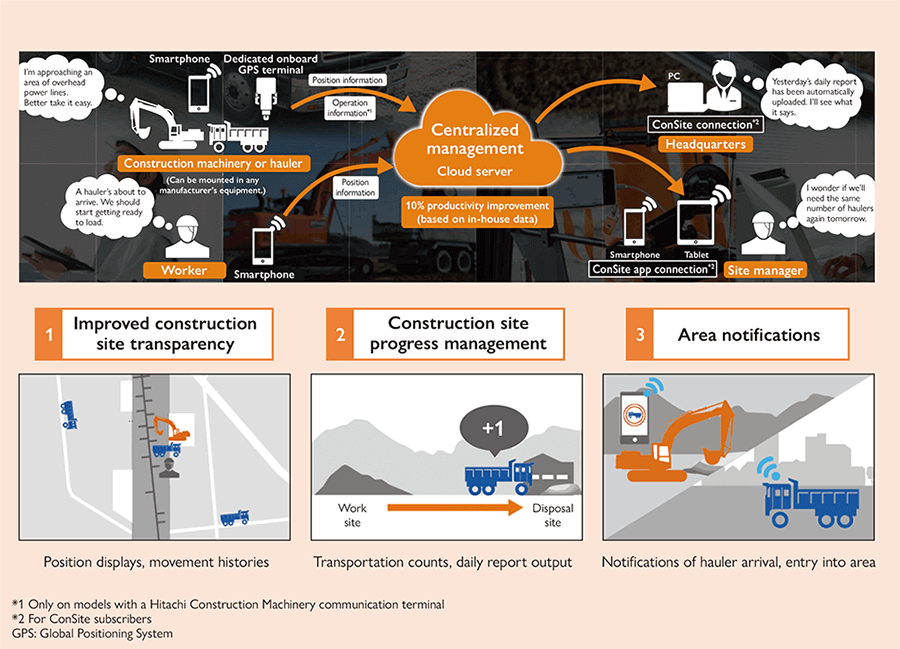
Hitachi Construction Machinery – the third-largest manufacturer in the world – has implemented the unique web-based, IoT-powered system. It enables better fleet management and simplifies the administration. Their innovative web-based system enables them to keep close track of fleet managing it through automatic monitoring, which helps immediately generate valuable data and process it. It also enables the end customers to extract maximum value from the machines. Thanks to embedded modules that are linked to sensors over the Internet, you can enhance the customer experience, manage manufacturing and detect and prevent any inefficiencies.
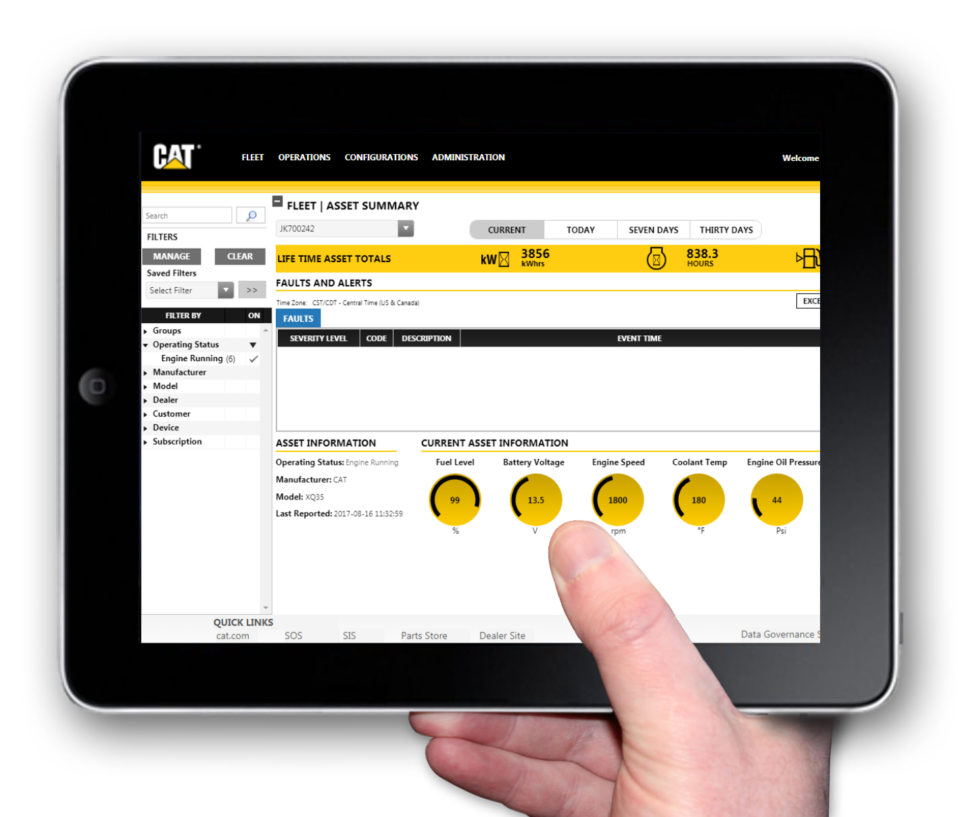
Caterpillar has established itself as an innovator being at the forefront of the tech revolution not only among heavy machinery manufacturers but as one of the top innovators in the automotive industry as a whole. They have automated their manufacturing process and increased efficiency. Moreover, they have started gathering valuable data to provide better customer service, fault management, and detection. They have also been collecting data that has been used in ongoing product development. The new generation of Caterpillar equipment will be able to fine-tune machine design based on real-time data.
Benefits of IoT for vehicles connectivity
There are multiple ways how IoV can improve the business operations for automotive industry players improving the value proposition as well as minimizing the risks. Let us tackle the main benefits of IoT for the automobile industry:
Challenges in IoT implementation
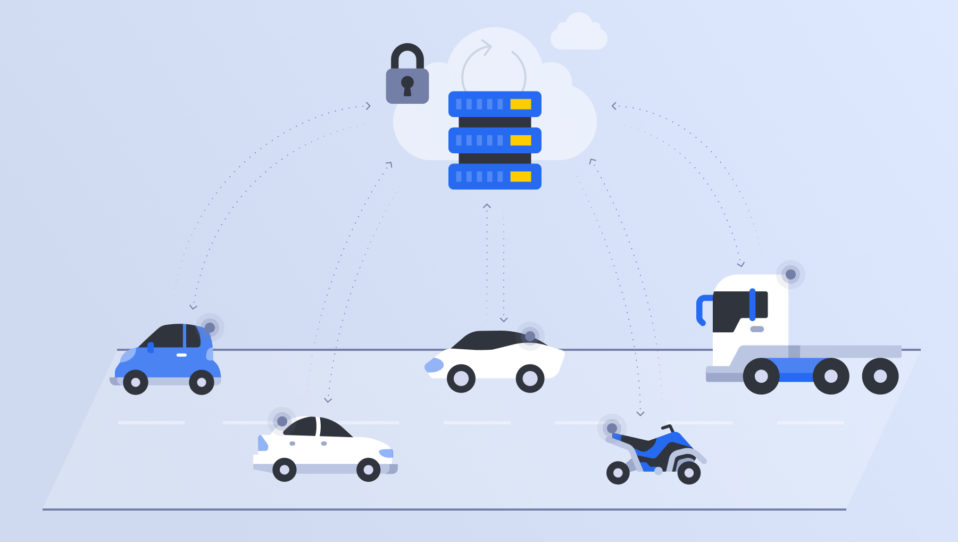
Since you have already taken the decision to integrate IoT into your automotive company, inevitably some key challenges will arise and you have to know how to be prepared. About 60% of IoT projects fail. That is a big contributing reason to why some companies are still hesitant to implement it. Here are the key challenges to be aware of and take into account to make the IoT project successful.
- Security. Based on Altamira’s experience, one of the biggest challenges in IoV implementation is data security. Vehicles generate and share huge amounts of data. Moreover, the connected networks syncs with various devices, technologies, and systems, which makes it a top spot for attacks. How to overcome this challenge: data encryption and regular backups. Moreover, one should have a risk-centered strategy in place and establish transparency over asset management.
- Long deployment time. Time is money, and the longer it takes to upload updates, the more money the manufacturer loses. How to overcome: choosing a tech partner who offers fast time-to-market. Instant deployment of updates allows them to outperform the competitors and attract more customers thanks to instant updating possibilities.
- Connection stability and network bottlenecks. The solution? Edge computing. Moreover, manufacturers have to make sure all nodes are able to transmit and receive information no matter the conditions and location of the vehicle.
- Huge amounts of data for processing. Connected vehicles generate huge amounts of data. Providers face significant challenges in managing constant data flows. The way to overcome this challenge is to increase storage capacity scalability.
Development of IoT automotive app
Successful execution of the customer’s idea depends mainly on the software development team. These are the supporting professionals that guide the customer through the world of tech possibilities and help to successfully put the business improvement idea into reality. However, there are some key sticking points that one needs to really consider and hone into when deciding to develop an IoT automotive app.
- Clearly set the goals and define objectives. When building custom IoV apps, defining the business needs and future specifications is a core stage that serves as a building block for the whole development process. The Altamira team will help you settle the key objectives and business needs that will add business value and allow you to increase your ROI.
- Consider the specifics of the future app design. The app should have a plain and user-friendly interface, voice and feature commands as well as minimal amount of distractions for the user. The Altamira designer with the relevant experience will guide you through all the key points to be taken into consideration.
- The suitable tech stack. For successful vehicle app implementation, one should take into account the nitty-gritty detail when choosing the tech stack. The future product should be able to: integrate/connect with a car computer, configure communication with iOS and Android devices through different protocols. The tech stack depends on the target audience of the app. Here all the responsibility lies on the development team that will conduct the research and select the best tech stack to use for the development. The programming language is also important as well as third-party integrations.
- Development and testing. The app should be tested for all possible bugs. Agile methodologies utilized by Altamira allow testing the product ever since the beginning stages of product development. It also allows to speed up the development process and minimize all the possible risks.
Develop a custom automotive app with Altamira
The Altamira team provides all types of services you need for successful app development, deployment, and management. We provide solutions from concept and design to monetization and operation over time. We provide scalable, stable and secure solutions that meet your needs in terms of coverage, quality and price.
What we offer as your tech partner:
- Discovery phase defining your business objective and future apps specifications to increase ROI in the nearest future;
- Define and test specific minimum viable products (MVPs). Conduct rapid proof of concept using agile methodologies;
- We guarantee transparency of all processes and the ability to attend team meetings and control the development process throughout all stages of development;
- Fast time to market to surpass the competitors and win the favor of users;
- Use AI and ML technologies to curate and enrich data that “thinks” and “acts” to meet specific business needs;
- The average modern car now has about 100 million lines of software code. This requires advanced coding techniques and management. Our team conducts regular code reviews;
- We guarantee data security and scalability to be able to accommodate the processing and storing of large amounts of data;
- We offer real-time personalization and recommendations of streamed video or music for a better customer experience of your app;
- Utilize the power of ML/AI and create apps with predictive maintenance features.
Our success stories
MuTag – a mobile app designed to manage the MuTag device, which is attached to any item that can be missing or requires identification of its location. You may attach the MuTag device to your passport and track the item. Main features: crowd tracking feature, offline working mode, restoring the background when the app collapsed, unique notifications.
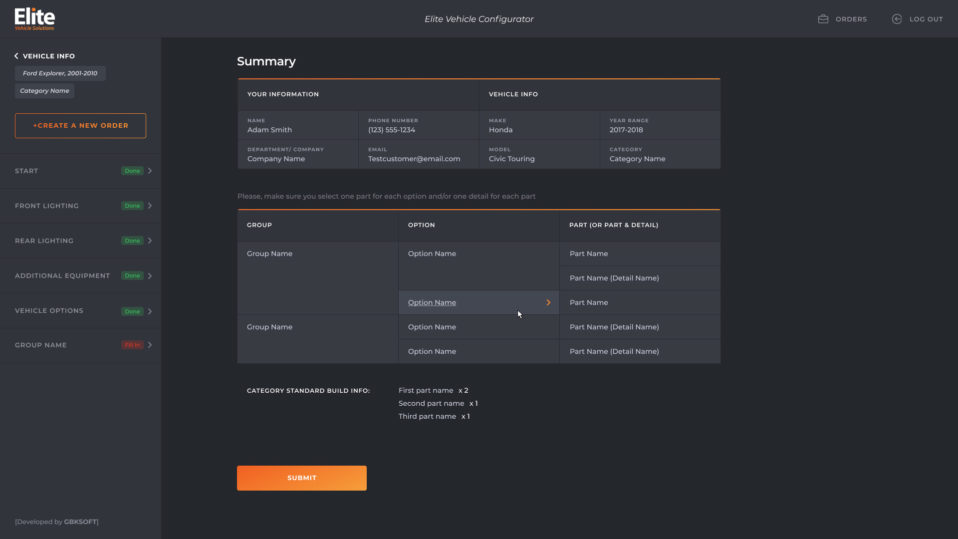
Elite vehicles – a project aimed at automatizing manual work connected to defining all special parts of the vehicle and manually creating the list of such parts based on the order from a customer. There was the need to collect all these parts from storage using part numbers. The software allows to gather the order details from the end customer, from the list of parts associated with the order instantly upon its creation, then send the order with the needed parts to the car supplier, where each part has a number associated with it.
Summing up
In the automotive industry, IoT is a game-changer that enables unrivalled benefits and unleashes unparalleled efficiencies, taking your business to a whole new level. It brings us one step closer to the future of smart, autonomous vehicles. Not only that, the introductions of groundbreaking technologies continue to make IoT even more compelling; such as for example 5G internet technology, which means faster data transmissions and response times, as well as enhanced vehicular communication.
The need to maximize productivity and save time in this fast-paced era will only increase the usage of IoT devices over time. As for the automotive industry, Internet of Things applications open up entirely new opportunities. It is already being used in a number of areas within the automotive industry and the possibilities of its application will only continue growing.


